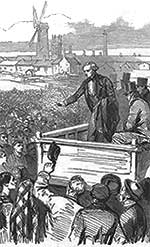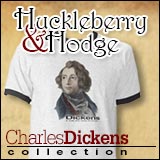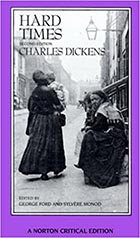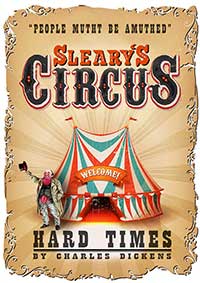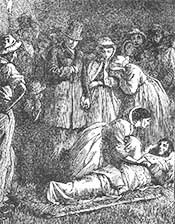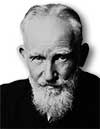Charles Dickens'
Hard Times
Hard Times for These Times
Hard Times - Published in weekly parts Apr 1854 - Aug 1854
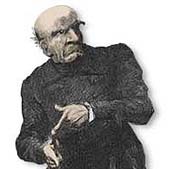
Thomas Gradgrind-Harry Furniss 1910
As a result of the demands of weekly serialization Hard Times is stripped of most of Dickens' trademark humor, rich characterization, and subplot. What remains is Dickens stripped down to the bare essentials, what novelist Angus Wilson called "more of a menu card for a meal rather than one of Dickens' feasts" (Ford, 1966, p. vii).
Dickens again flies the banner of social reform, touching on themes of industrialization, education, and Utilitarianism in the sweeping Industrial Revolution of the 1850's.
Dismissed initially as "sullen socialism" (Macauley as cited in Schlicke, 1999, p. 265), the novel gained new life with F.R. Leavis' positive critical treatment in The Great Tradition (1948). Leavis considered Hard Times Dickens' "masterpiece" and "his only serious work of art" (Kaplan, 2001, p. 364). Since then it has been one of Dickens' best-sellers, widely taught in schools, partly due to the fact that it is Dickens' shortest major work.
Plot
(contains spoilers)Thomas Gradgrind runs a school of hard fact in the industrial city of Coketown. He happens to see his children, Louisa and Tom, peering into a circus in direct opposition to his views on things of fancy. The cause for the offense, suggested by Gradgrind's friend Josiah Bounderby, a "self-made man" banker and mill owner in Coketown, is that Sissy Jupe, the daughter of one of the circus folk from Sleary's traveling circus, has been enrolled in Gradgrind's school and is a bad influence. Gradgrind and Bounderby proceed to visit the girl's father in order to have her removed from school. They find that he has abandoned the girl and Gradgrind agrees to take her in in the hope of reforming her on the condition that she never mention her former life.
Stephen Blackpool, a power loom weaver in Bounderby's mill, is married to a drunk and asked Bounderby how he can get out of the marriage to marry Rachael, another worker at the Mill. Bounderby loftily tells him that he married "for better or worse" and without money cannot be released from the marriage. After his visit to Bounderby he meets an old woman (Mrs Pegler) in the street who tells him she comes to Coketown every year with the hope of a chance sighting of Bounderby.
Tom, Louisa, and Sissy finish school, Sissy unsatisfactorily. Tom is apprenticed to Bounderby. Bounderby asked Gradgrind for Louisa's hand and she reluctantly agrees to marry him in the hope of helping Tom. Sissy remains with Mrs Gradgrind to help raise three younger children.
James Harthouse, with a letter of introduction from Gradgrind, now a Member of Parliament, meets Bounderby and becomes a frequent visitor in the household. Harthouse has hopes of going to Parliament.
Stephen Blackpool refuses to unionize with workers of the mill and is ostracized and later fired from his job. Tom has taken to gambling and has fallen heavily into debt. Louisa and Tom visit Stephen and Louisa sympathetically offers money to help him relocate. Tom takes Stephen aside and asks him to loiter around the bank in the evenings before he leaves town on the pretense of offering work.
The bank is robbed and Blackpool, seen loitering about the bank in the days before the robbery, is suspect. Harthouse falls in love with Louisa and tries to lure her away from her unhappy marriage to Bounderby. She flees to her father and reveals the unhappiness she has felt since childhood, he softens as he realizes the mistakes he made in her education.
Louisa stays with him, cared for by Sissy. Bounderby abandons her. Mrs Sparsit, Bounderby's housekeeper, captures Mrs Pegler and brings her to Bounderby's house where she is revealed to be Bounderby's loving mother, disproving Bounderby's story of being a self-made man, abandoned as a child.Rachael sends word to Blackpool, who has gotten work in another town, telling of the suspicion in the robbery and expects him to come back to clear his name, but he doesn't show. Rachael and Sissy, walking in the country, come across Stephen's hat near a deserted mine and realize he has fallen in. They summon help, Stephen is brought out alive but dies on the way back to town. Before dying he tells Mr Gradgrind to question his son, Tom, concerning the robbery. Tom, knowing that capture is close at hand escapes, with the help of Sissy, to a town where Sleary's Circus is performing. Thomas, Sissy, and Louisa meet him there and, after a last minute attempt by Bitzer to capture him, escapes abroad, with the help of the circus folk, where he later dies in misery. Thomas Gradgrind abandons his inflexible demands for facts in favor of "Faith, Hope, and Charity."
Complete List of Characters:
Character descriptions contain spoilersGeorge Bernard Shaw
George Bernard Shaw, writing in 1912, observed that with the publication of Hard Times:
"You must therefore resign yourself, if you are reading Dickens's books in the order in which they were written, to bid adieu now to the light-hearted and only occasionally indignant Dickens of the earlier books, and get such entertainment as you can from him now that the occasional indignation has spread and deepened into a passionate revolt against the whole industrial order of the modern world. Here you will find no more villians and heroes, but only oppressors and victims, oppressing and suffering in spite of themselves, driven by a huge machinery which grinds to pieces the people it should nourish and ennoble, and having for its directors the basest and most foolish of us instead of the noblest and most farsighted.
Many readers find the change disappointing. Others find Dickens worth reading almost for the first time..." (Kaplan, 2001, p. 359).
Excerpt:
Now, what I want is, Facts. Teach these boys and girls nothing but Facts. Facts alone are wanted in life. Plant nothing else, and root out everything else. You can only form the minds of reasoning animals upon Facts: nothing else will ever be of any service to them. This is the principle on which I bring up my own children, and this is the principle on which I bring up these children. Stick to Facts, sir! (Hard Times, p. 1)
Thomas Gradgrind - Hard TimesPeople mutht be amuthed...they can't be alwayth a working, nor yet they can't be alwayth a learning (Hard Times, p. 41).
Mr Sleary - Hard Times- Sketches by Boz |
- Pickwick |
- Oliver Twist |
- Nickleby |
- Old Curiosity Shop |
- Barnaby Rudge |
- Chuzzlewit |
- Christmas Carol |
- Christmas Books |
- American Notes |
- Pictures from Italy |
- Dombey and Son |
- Copperfield |
- Bleak House |
- Hard Times |
- Little Dorrit |
- Tale of Two Cities |
- Great Expectations |
- Our Mutual Friend |
- Edwin Drood |
- Minor Works |
- The Uncommercial Traveller |
- Short Stories

